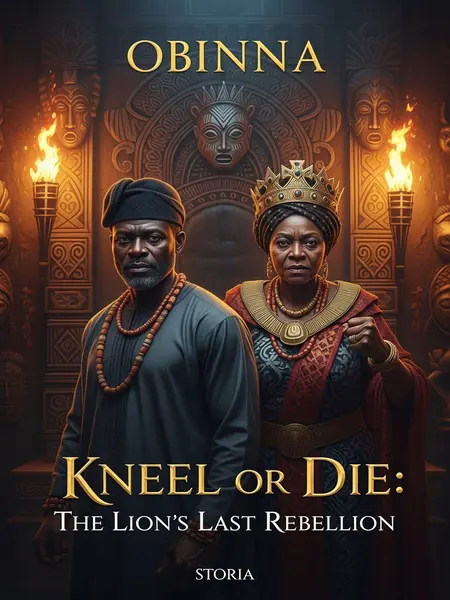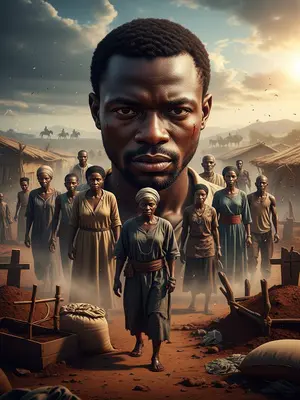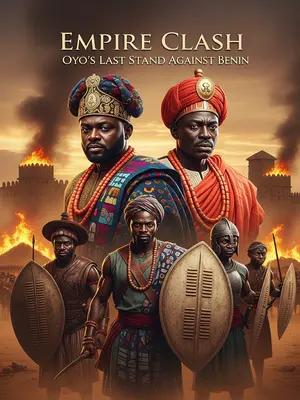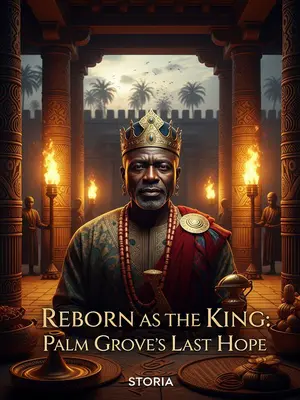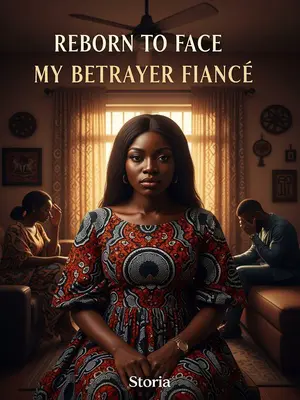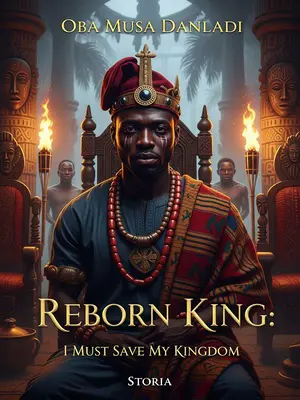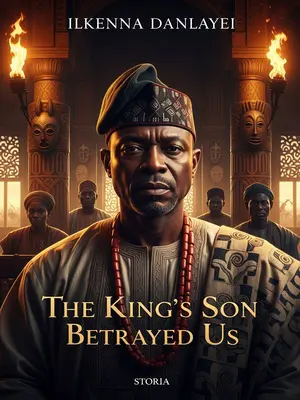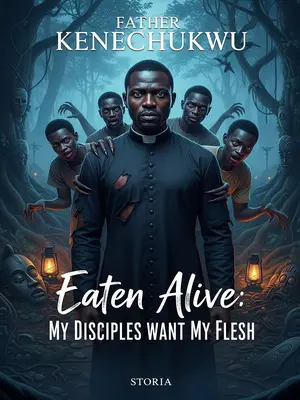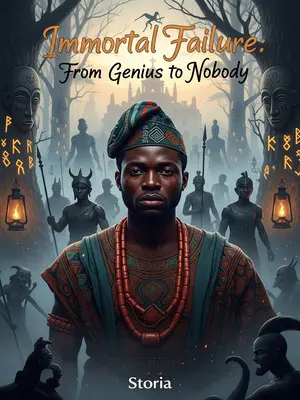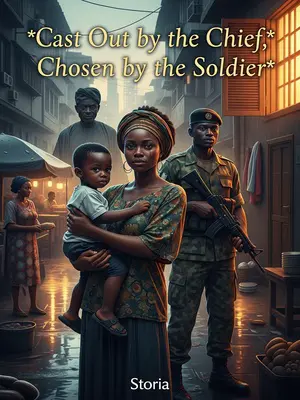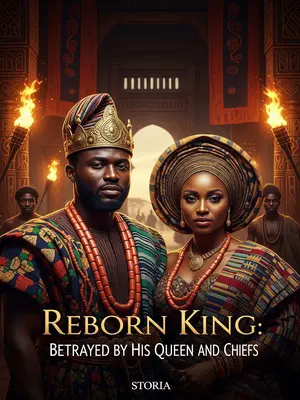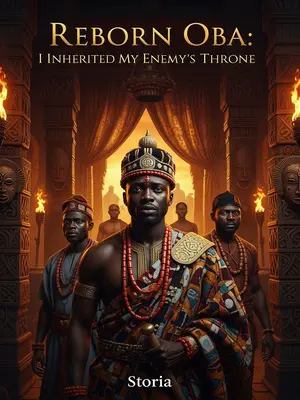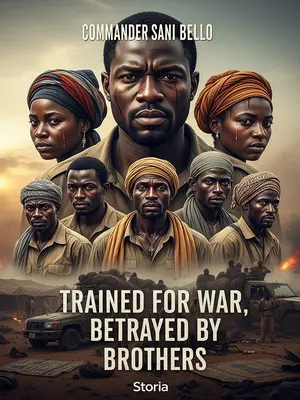Chapter 3: Lion’s Shadow and Adesuwa’s Gaze
After some months, Obinna no fit pretend again, and e no even need to.
He moved through the palace with a new stiffness, each day caring less about hiding his displeasure. Servants whispered, ‘Our king don tire. E fit be say wahala dey come.’
Because Obinna finally see clue for secret files and reports, e make am happy—he feel say e fit try again, maybe chance dey to train soldiers.
The thrill of discovery sent a jolt through his blood. Late at night, by candlelight, he poured over reports smuggled in hollowed-out yams, eyes wide, fingers trembling. Each clue was a thread, a promise that change was possible.
Truth be say, no be everybody for Garba council be mumu. The British people don burn Royal Library—who no want strong army?
He found unexpected allies in unlikely places. Some chiefs grumbled but secretly agreed; even the palace storytellers, who heard all, muttered, ‘If library dey burn, army gats strong!’ The hope for a real fighting force flickered anew.
But when Adesuwa call Royal Guards make dem start new army, six Royal Guard nobles die of fear that same day—nobody wan suffer army training wahala.
The news spread quickly—six nobles collapsed, one even dropping his goat-hide fan. Some claimed it was spirits, others said old age, but everyone knew it was pure dread. The younger guards laughed, but none volunteered for drills. Even the palace cats seemed to grow fatter and lazier, purring at the thought of no training.
These Royal Guards na only pigeon dem dey fly, dey fight ram, dey drink and smoke igbo when dem no get anything to do. Sometimes, dem go even chase goat enter palace kitchen, just to avoid training. If money finish, na to sell army food and armor. Who go leave that kind soft life to go train for army?
Obinna smirked as he watched guards playing drafts with bullets, feathers stuck in their hair. Their swagger was for show; when it came to sweat and sacrifice, they vanished like early morning mist. The palace storeman complained, ‘Food dey miss pass soldiers wey dey train.’
No wahala—Adesuwa still fit bring foreign teachers, hire Western military experts, if anybody sabi, dem fit help train. To train loyal Igbo army for Garba no too hard.
Outside consultants came and went, their accents thick, their advice thinner than pap. The chiefs nodded politely but did nothing. Only Obinna’s eyes followed every word, mapping strategies in his mind, waiting for the day the talk would become action.
But military matter need sense, and for all Royal Guards, no single person fit deliver.
He realized, with a bitter laugh, that the greatest enemy was not the invader, but laziness dressed in royal colours. No war could be won with men who feared their own shadows.
If new army must show, na only Igbo people fit do am, train Igbo soldiers… so wetin remain?
He pondered late into the night, listening to the call of nightjars, his mind running through names, faces, and possibilities. ‘If na only us go save us, make we start from inside. Nobody go dash us freedom for market square.’
Foreigners na only to kill commoners, steal money, collect small land, but Igbo people na real threat to Garba dynasty. Which one serious pass? Adesuwa sabi the answer.
She saw clearly that the greatest danger was not the white man with his gun, but the restless spirit of her own people. She guarded her power with the suspicion of a hen watching over her chicks.
So the matter of new army training, dem just push am aside, lock am, forget am.
The files disappeared into the bottom of a chest, covered by old wrappers and the dust of forgotten dreams. Obinna’s heart sank, but his eyes sharpened with the determination of a blacksmith facing stubborn iron.
Obinna just dey curse for mind, but e still go meet Adesuwa, think say e no bad—if nobody fit train soldiers before, now wey he dey, e go work.
He forced himself to smile, bowing low, his words careful but edged. ‘Mama, this thing wey una dey fear, na only we fit solve am.’ His voice was steady, but his hands trembled behind his back, knuckles white.
But Obinna still underrate Adesuwa wahala.
Adesuwa’s eyes, sharp as razor, missed nothing. She watched him with the calm suspicion of someone who had survived too many betrayals. Her laughter was soft, but her gaze was heavy—like a curse that followed him into every room.
That day, Adesuwa look Obinna wey dey kneel for ground from up.
She sat high on her carved stool, fan in hand, eyes never leaving him. The courtyard was silent except for the gentle swish of her aso-oke wrapper, and the nervous shifting of the chiefs around her.
She call plenty Igbo chiefs wey sabi army matter, dey ask dem everything—Western army style, old tactics, supply, new army equipment.
Her voice cracked the silence, ‘Tell me, Chief Okafor, how did your grandfather train warriors?’ One by one, the chiefs answered, sweat beading on their foreheads, voices trembling beneath her gaze.
Obinna answer everything sharp sharp.
He spoke with the ease of a man who had seen battle, his words painting pictures of strategy and hope. The elders listened, nodding, some drumming fingers on their knees in approval.
To say he answer well na small—he don spend months dey read army books day and night, plenty of the plans and ideas wey he talk even make the chiefs clap.
The oldest chief, toothless but fierce, banged his staff and shouted, ‘This pikin get sense! He fit save us, no doubt!’ The applause echoed off the palace walls, briefly lifting the gloom.
The chiefs dey hail, say, His Majesty na gift from God, sent to Garba to fight the foreign powers.
Some even muttered prayers under their breath, asking the spirits to bless Obinna and bring victory back to their land. Hope flickered in their eyes, for the first time in years.
Adesuwa face no change, so the chiefs wey happy before just quiet, and Obinna wey still dey kneel, cold catch am for heart—this kind atmosphere, he don see am before.
He felt a chill crawl up his spine. The cheer faded, replaced by the heavy silence of expectation unmet. He recognized the tension—a mother’s pride mixed with fear, a ruler’s heart divided between love and suspicion.
Dear father, na real dear father—even worse than my own papa.
He remembered his own father’s silences, the way love could curdle into rivalry. But Adesuwa was something else—a woman who loved power more than any child. Her eyes spoke volumes, and Obinna felt the weight of generations pressing on his back.
At least my papa go wait till I win battle before he dey fear me, but you, you never even let me start, you don dey guard?
He swallowed, head bowed, knowing that in her mind, his first victory might be her last. The room grew colder, the shadows stretching longer as hope retreated.
That day, Adesuwa just say she tire, no give any answer, but Obinna feel say spies around am don plenty, and the new army matter just dey go far.
She rose, voice flat, declaring, ‘I am tired. Leave this matter for another day.’ The meeting dispersed, but Obinna noticed new faces in the corridors, eyes that never met his, whispers that ended when he entered.
Big wahala dey ground, and Obinna for Royal Compound, come dey feel like nothing don change for thousands of years.
The palace routines rolled on—market women still hawked roasted maize outside, drummers still practiced for the next festival, but for Obinna, the world had frozen. The same fears, the same obstacles, century after century.
Still, na one dynasty heart dey fight for the heart of the people, na one person dey fight for the heart of dynasty.
He recognized the eternal struggle—family against family, dream against dream. The battle was not just for land or power, but for the soul of a people, their place in the great river of history.
Garba no send whether Umuola survive, Adesuwa no send whether Garba survive, Igbo people get army go shake Garba council, if na me get army, na Adesuwa power go shake—na the same thing.
He laughed softly, a bitter sound swallowed by the rafters. It was all a circle—one hand pushing, the other pulling, and no one willing to break the chain.
Obinna just smile for corner. Okay—this pattern wey don last for thousands of years, somebody must break am.
His smile widened, sly and hungry. ‘If nobody wan break am, then na me go scatter am—make we see who go cry last.’
Tomorrow hero never show. But today, na me dey here—so who go do am if no be me?
He clapped his chest twice, whispered prayers to his ancestors, and resolved that, come rain or shine, he would play his part—let the world remember who truly ruled these lands.
